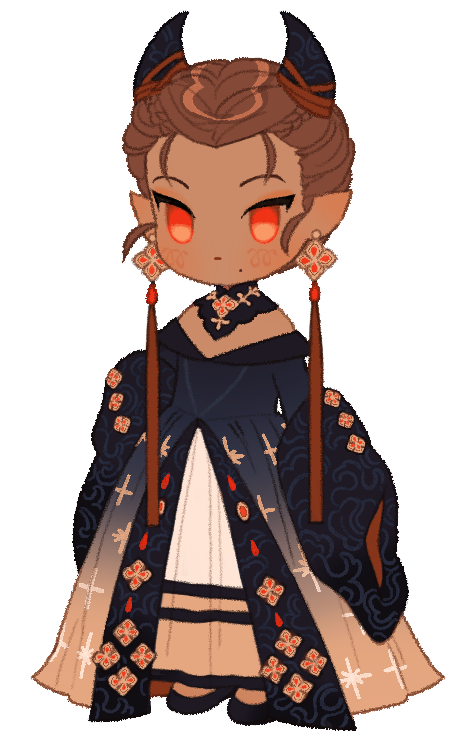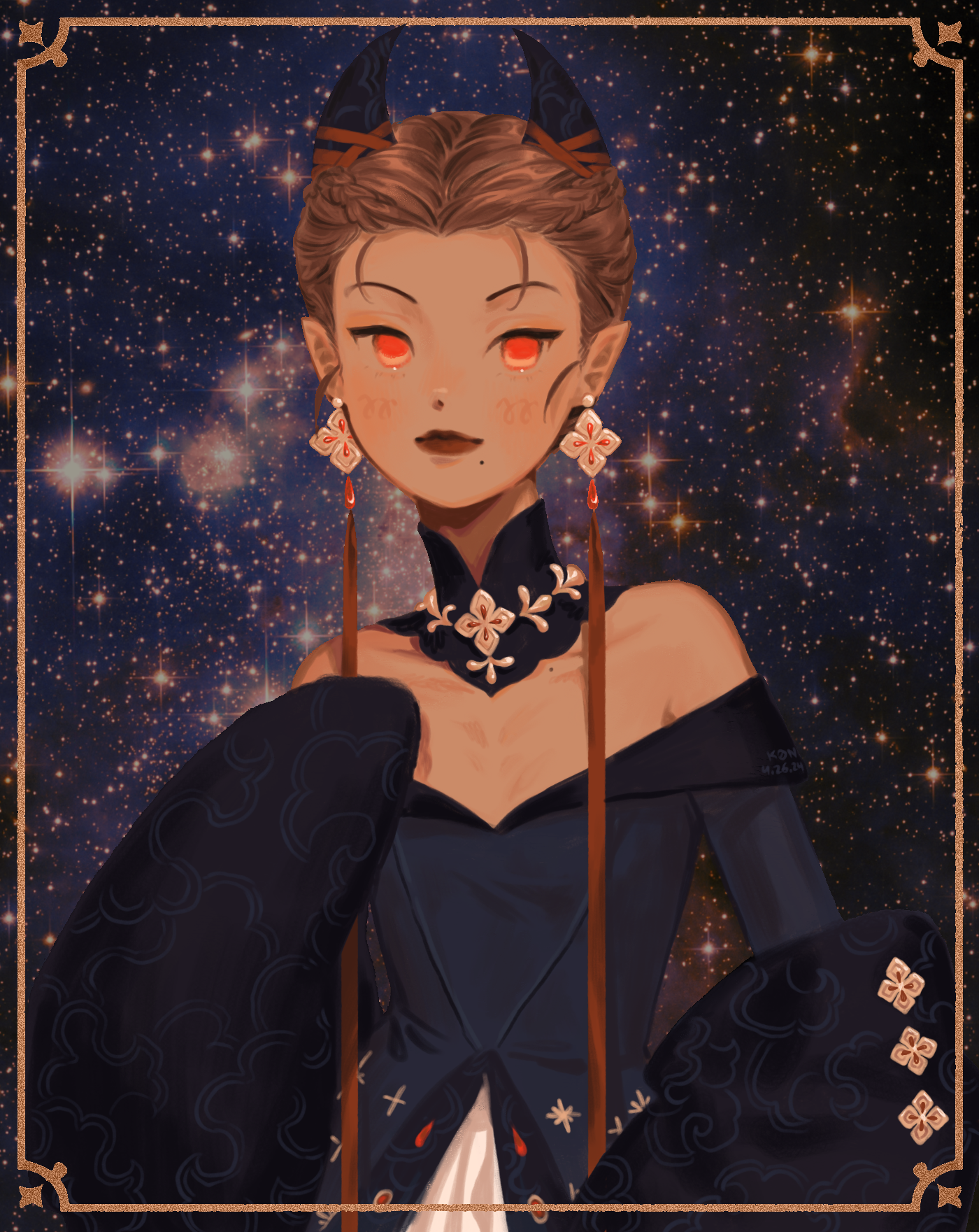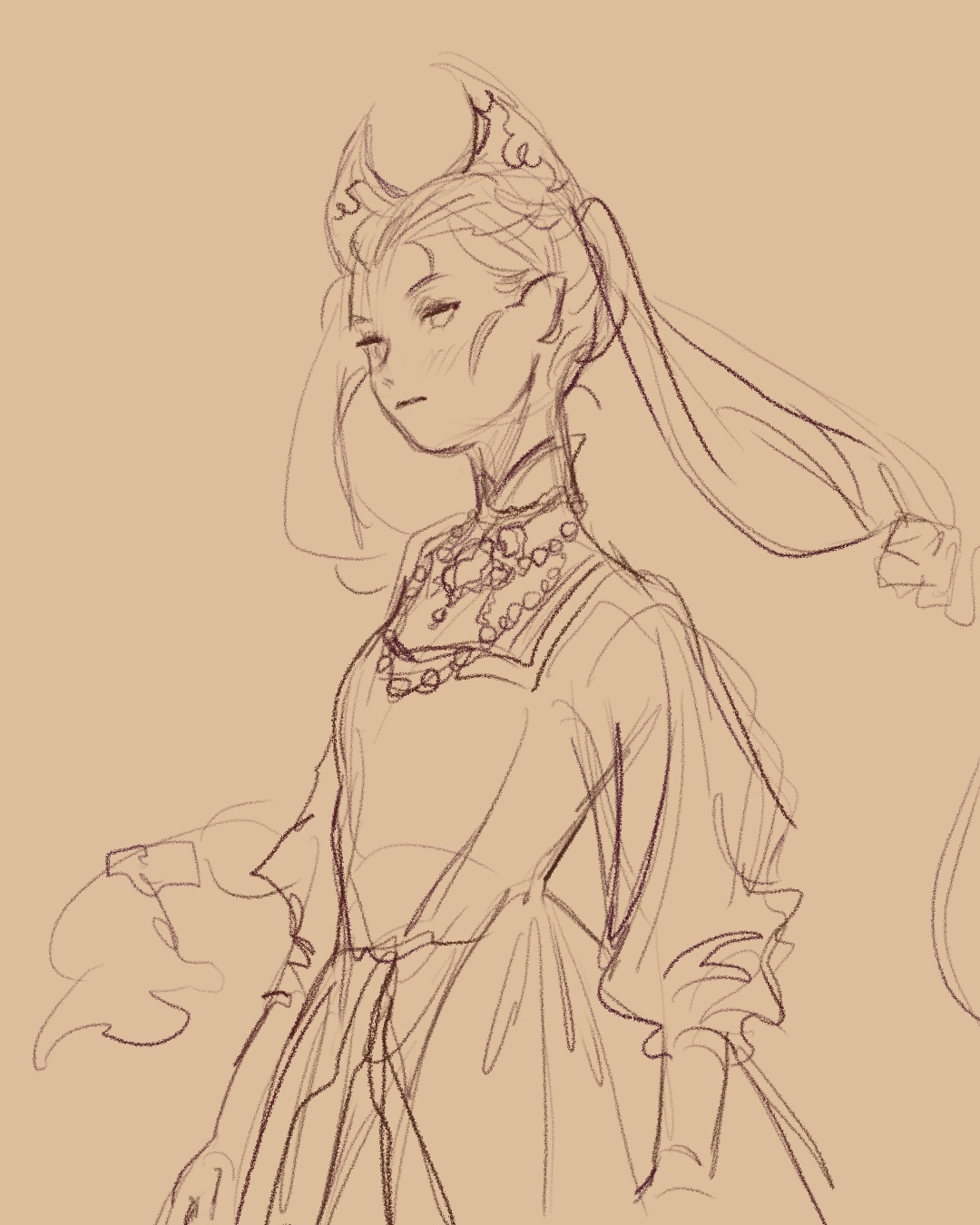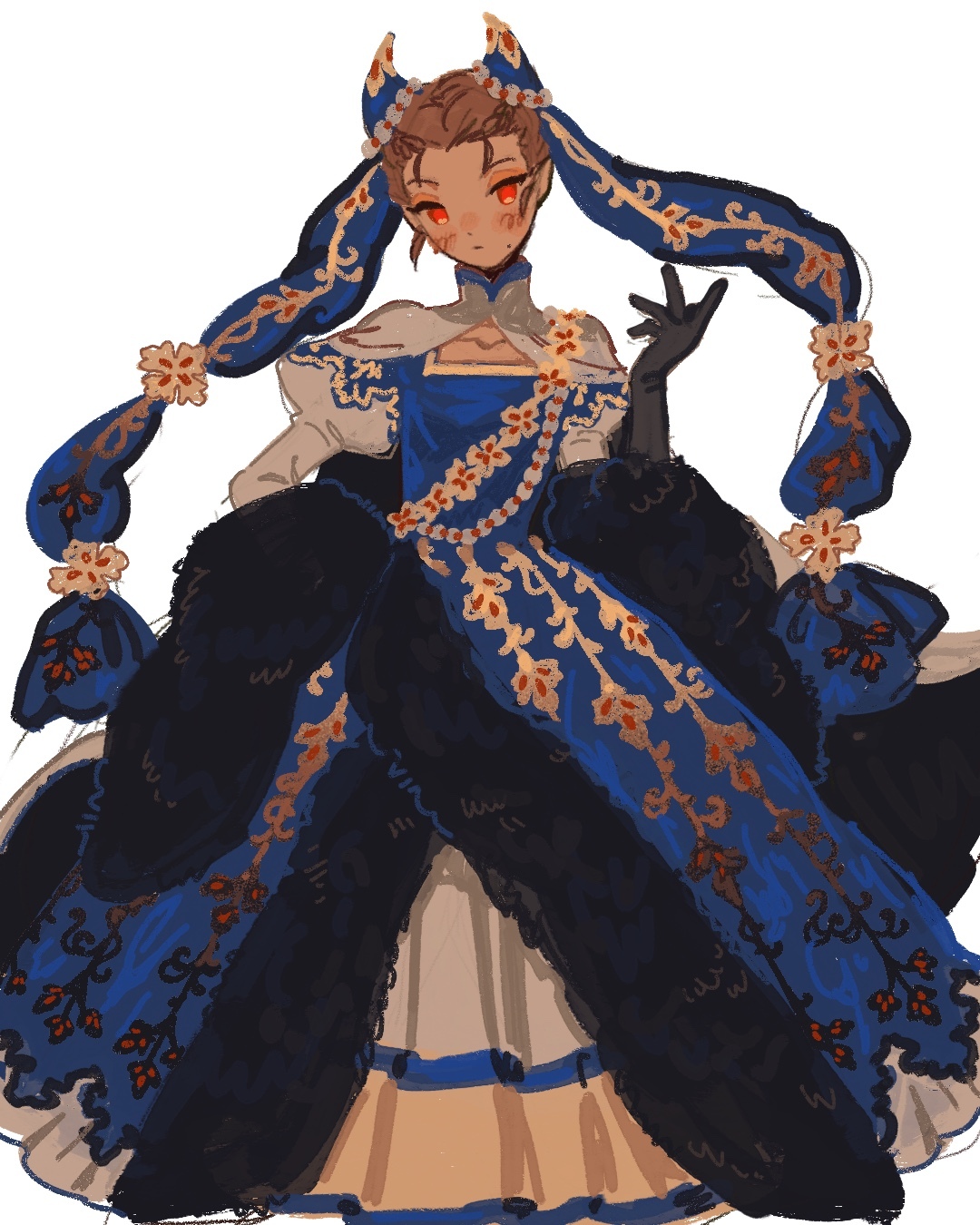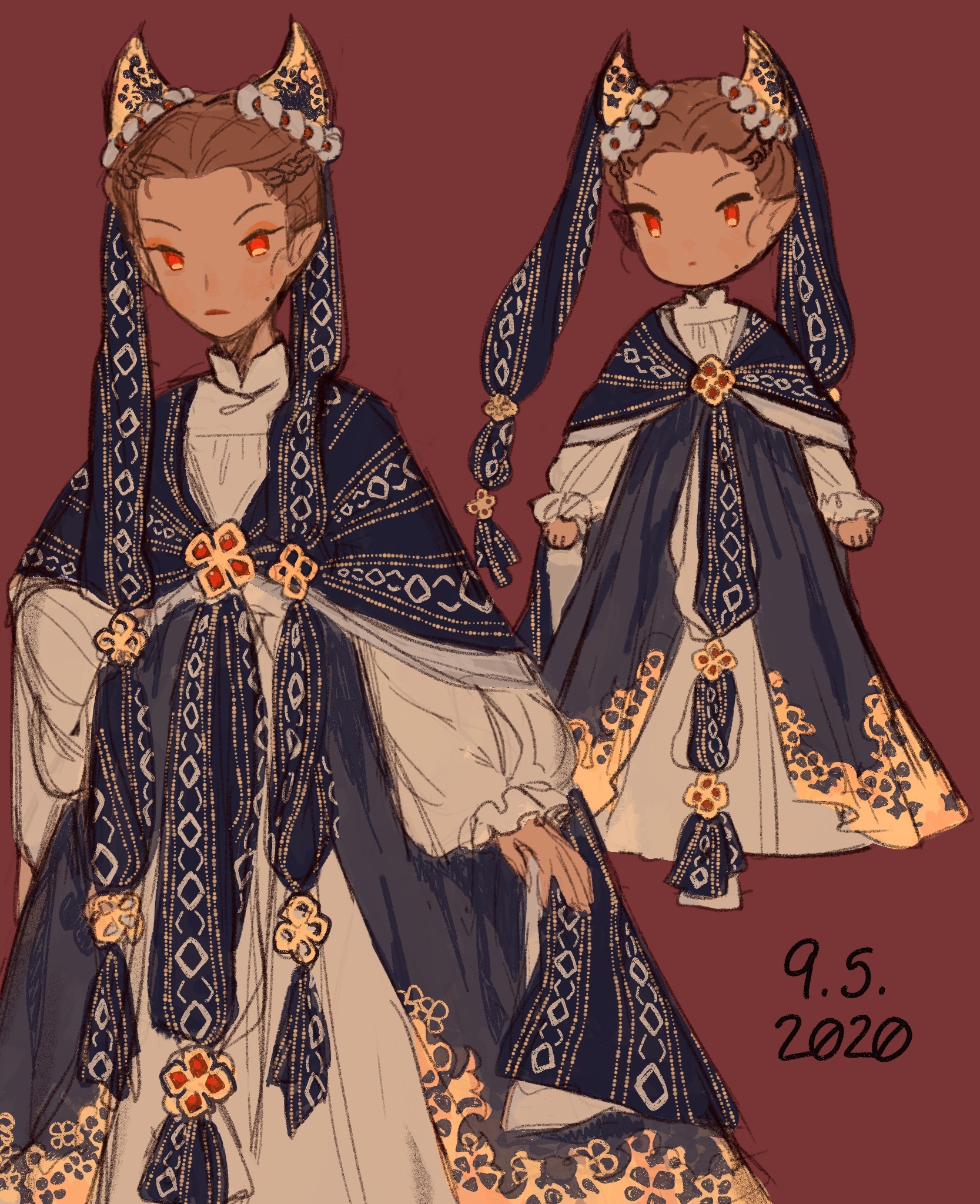Backstory
Granted, being one of Pandora’s Miseries enlists you to a life loaded with loathing. Chimäre never had the thought cross her mind, since she followed her purpose for as long as she could remember. When humans felt loathing, she benefited from it and strengthened those negative emotions within them. Did she care for humans, for her own power? Not really. But she did care about art. She integrated into civilization, into a small town in Europe. Feigning the life of a noblewoman for a while, with suitors every now and then adding to wealth she didn’t need, passing time by commissioning all kinds of art— paintings, custom gowns, sculptures. She liked the way paintings were fleeting memories you could revisit, like the brief glowing of clouds during nightfall or a portrait of a human life at the peak of its beauty.
Chimäre herself didn’t change in appearance as easily as a human ages, thus all commissioned portraits of herself looked the same at a glance, but the different eras shined in the subtle differences painted; different outfits, sceneries, down to the changing of painting textures as art itself developed. As delightful as it was to fill a castle with all kinds of curios, the dust would repeatedly settle and her reputation was criticized for a couple more generations. Chimäre didn’t commission more artwork unfortunately, leaving home less if being seen as something along the lines of an “immortal witch” could escalate and threaten her collections. Even so she did save up a lot of art supplies, some left behind by the lodged artists who once created for her in her castle. She could always make her own art, she thought. At first she wasn’t too good, but with a millennia to practice she got the hang of it. Always indulging in something humans do, it was ironic for her, unnecessary, but she wouldn’t deny she was a fan of their creations. Absorbed in her secluded life, she had only focused on the present until a young boy stumbled into her castle.
Human children don’t bring harm, and to Chimäre the boy looked as harmless as a calf. Who was she to escort them into town, he would look like a hostage at her side for sure, and he was adamant about not going back to his home. Chimäre’s became his new home in the end, and Chimäre became something like a mother to him. From then on, she continued to disregard the world around them, passing time with her art as always, her son beside her. While he ran about in the castle halls, Chimäre had gotten a visit from an old friend, Ephialtes. “What are you thinking to have that human so close to you? Are you using him to garner endless power?” Ephialtes would ask. Chimäre was honest that there was no need to profit from his despair, it was as if he didn’t have any since the day she took him in. They mutually promoted the other’s happiness, and Ephialtes could not understand it. As high as they regarded Chimäre, they did give up asking her to join them in their conquests, figuring Chimäre could always join later when the human boy’s lifespan runs out. His death wasn’t something she wanted to think about now, knowing in the back of her mind that would come one day, but it happened sooner than she expected.
The King took an interest in the secluded castle on his territory, where townspeople came up with all kinds of rumors, where descendants of artists inherited sketchbooks of the castle’s lady. Driven by self pride, he visited Chimäre who was not pleased at the self invitation(and she had wet paint she needed to use first!). As much as she wanted to deter the King from her son’s presence, and being so exhausted hearing about his politics, the King did take a liking to her. She was used to suitors whose interest would fall off, but when the King persistently hinted he figured she wasn’t human, she had to ask him to go. He said he wanted a wife who wouldn’t become wrinkled and grey, pointing out all the portraits where she hasn’t changed, but Chimäre had no reciprocation for him, and it could be he just assumed she harbored a secret to eternal youth. Gifts sent to her, offers to have her painted, even sculpted, were rejected. When nothing worked, he began to threaten her for her hand in marriage.
It had gotten troublesome for not only Chimäre, but for her son. He would answer the door to see gifts pile and pile up to the time he became a young adult, but one day he opened the door and was greeted by armored knights rather than servants bearing gifts. This time the king sent a particularly extravagant set of flowers, full enough to hide poison within them. With the scent of the bouquet overall being so pleasant, too much to keep in one room, Chimäre’s son decided to distribute it around the house. It’s not something his mother cared about, but flowers should be put to good use. However, all the exposure to the poisonous plants had her son feeling ill, so weak that he had eventually passed away due to complications from the contact. When Chimäre pinpointed the source she flew into a rage against the King, certain she would get revenge.
Even with her son no longer returning, she was set on vengeance. The now empty vase of flowers became a large container for oil, carried all the way to the King’s castle as she snuck past his dormant guards one night. Leaving a trail of black oil up to his quarters, he awoke to the noise of her stirring outside of his room. With the last splash doused on the silken canopy curtains of his bed, any pleads to reason were ignored as she set fire to the castle. Still, he was persistent as ever, attempting to run out of the aflame walls, but Chimäre was just as persistent. In his haunting final moments, Chimäre was the one who had slain him, further empowered by the despair he found himself in. By the time the townspeople put out the fire, the damage was irreparable, and many frankly moved on. Chimäre went back to her empty castle, took a seat, and began to paint.
Now, painting continued to be her past time, perhaps what she could do for the remainder of her eternity, not wanting to think of anything else. Portraits of herself were outnumbered by the memory of her son, in what could have been an attempt to document how special he was in her eyes. When she was tracked down by a Pandora, she didn’t bother rising to her feet, paintbrush still in hand. Requesting permission to finish up one last painting, the Pandora had it granted, watching until she was finished. She wondered if the Miseries were meant to stay sealed away forever, was it that she was a bad omen to those around, was she undeserving of a calm eternity? If there was a chance of the same tragedy repeating, she figured that disappearing would be beneficial. Selecting a porcelain Chinese urn from her collection as her container, she allowed the Pandora to seal her away.
“I suppose this urn is from a faraway kingdom. When I’m gone, can you return this urn where it belongs?”
And so her fate was sealed. Carrying the urn across many countries, the traveling Pandora dropped it off with a sedentary Pandora in China. The rest is history, with the urn inevitably collecting dust in a storeroom of Gingko’s family’s temple.
While sealed, that gives the opportunity to listen to your thoughts for an eternity, conversing with yourself about what ifs and undisturbed fantasies. During her time alone, Chimäre didn’t expect to ever be unsealed again, but when she was, the moment happened so fast. A human named Ijus, a modern day girl who could sense a sadness from the Urn, felt compelled to open the container. When the lid came off, Chimäre was enveloped in the faint brightness of the day, a bleak yet stark light compared to the darkness she was constantly in, and Ijus glowed more than anything else in that moment. Unleashed, briefly eye to eye with the young woman who released her, Chimäre had sensed death on her, a haunting feeling that she felt compelled to prevent. Unconsciously taking control of the human’s body, Ijus became Chimäre’s vessel moving forward, ultimately repelling the curse of death that was upon her. Miseries can tell when another misery has used their abilities on a person, but curses are the most unmerciful act, one tactic that most of them do not dare use in the first place. The Misery that cursed Ijus’ bloodline with a string of untimely deaths was a terrible being, one Chimäre personally didn’t warm up to in their days sealed together. When she possessed Ijus, her curse was indefinitely suspended, but it was unclear if it’d return if Chimäre separated from her. Promptly seeing her old acquaintance Ephialtes, who’d planned to have Chimäre unsealed, the two ran off before others could pursue them. It was a surprise to them that a human vessel would be dragged into things, but Ijus became like a shield that other humans and Pandora’s couldn’t bring harm to. Able to communicate in mind with one another, Ijus and Chimäre delevoped an understanding between each other to work together, with Ijus understanding that Ephialtes wants to work towards stopping a pair of truly evil Miseries, and that Chimäre is someone she wants to root for. Of course, other groups are involved in the hunt for the scattered Pandora’s boxes, including Ijus’ wife Gingko, who inevitably wants to be reunited with Ijus. While Chimäre understands Gingko’s sentiments, she wants to keep her out of the ordeal out of Ijus’s concern towards her.
